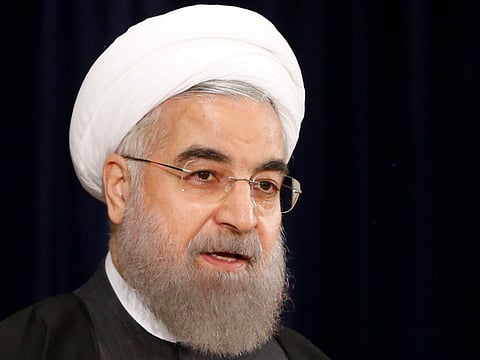Another example of US duplicity
It seems that under pressure from Republican lawmakers and regional allies, Obama has swapped his olive branch held out to Tehran for a whip

Congress is leaning heavily on the White House to sign off a new set of anti-Iranian sanctions related to its testing of conventional ballistic missiles unrelated to the terms of the agreement signed with the P5+1. In response, President Hassan Rouhani has threatened to dramatically scale up missile production, on the grounds nothing will be allowed to interfere with Iran’s right to self-defence, while warning Iran will consider the implementation of sanctions a breach of the nuclear deal.
The hopes of those looking forward to a broader detente between these old foes have been dashed by US lawmakers, who’ve forced a budget making it more difficult for Americans to do business with Iranian companies, and imposed visa restrictions on Iranian nationals and anyone who has an Iranian stamp in their passports. Iranian-American dual nationals have grave concerns. In reality, the nuclear deal was deeply flawed to begin with, especially since the nuclear watchdog, the IAEA, has confirmed that Iran has not been pursuing nuclear weapons capability since 2009. If that’s the case, then Iran has been legitimised, empowered and soon to be enriched for little in return apart from its acceptance of a more intrusive inspections regime.
Moreover, the deal did not take into account Iran’s aggression towards its neighbours or its expansionist ambitions via the use of proxy militias and for that it was harshly condemned by Israel as well as the GCC States. US President Barack Obama, who held up a normalisation of US-Iranian diplomatic relations carrot, argued, wrongly in my opinion, that a narrow deal was better than no deal.
Making mockery of deal
The agreement is akin to a sale contract relating to non-existent property when there was no pursuit of nuclear weapons in the first place — and if conventional ballistic missiles were an issue, there should have been a clause specifying restrictions on manufacture and testing.
New sanctions make a mockery of the agreement and Obama’s messages of goodwill to the Iranian people. Removing sanctions with one hand and slapping on more with the other is mixed-message madness from the very country that spearheaded the talks. It will be interesting to see whether or not the EU will follow suit given lucrative trade deals several member countries have lined up.
Iran doesn’t deserve to be welcomed into the international community’s fold until it quits interfering in Arab states (Lebanon, Syria, Iraq and Yemen) and puts a lid on its continuous hate-filled rhetoric directed at Saudi Arabia and others. That said, new US sanctions reflect badly on America’s credibility and its ability to forge deals with rogue nations designed to keep our planet safe in the future. It seems that under pressure from Republican lawmakers and regional allies, Obama has swapped his olive branch held out to Tehran for a whip. What this says loud and clear is, ‘The United States can’t be trusted’ which validates the Supreme Leader’s assertion in July amid a superficially warm ambience that the US will continue making demands once Iran discontinues uranium enrichment.
This isn’t the first time America has reached out to its foes with sticks and incentives to bend to its will. And it’s not the first time that compliance has been met with punishments.
Saddam Hussain, chastened in the aftermath of the 1991 Gulf War, rid his country of weapons of mass destruction and opened the door to UN weapons inspectors. For that, Iraq received crippling ten-year-long sanctions, believed to be responsible for the deaths of 500,000 Iraqi children, prior to being invaded and occupied. The dyed-in-the-wool anti-imperialist revolutionary Muammar Gaddafi renounced Libya’s WMD programmes in 2003 including long-range missiles, a surprise move that was overseen by the US, the UK and international organisations. Washington replied by normalising relations only to become a major player in his ousting and brutal public assassination eight years later.
In October, Obama said he was willing to talk to North Korea’s President Kim Jong-un on releasing sanctions in return for the country’s abandonment of its nuclear weapons programme. That possibility was slim then because the US had already reneged on an earlier agreement brokered by Bill Clinton that was later dashed by a Republican-controlled Congress that failed to deliver transitional oil in sufficient quantities and held back from listing sanctions. In light of Iran’s experience, detente between the US and North Korea anytime soon is even more remote.
Given America’s record of double-dealing, why should any leader be inclined to exchange his nation’s deterrents in return for the promise of peace and prosperity; promises that have been repeatedly broken? The Iran deal was short-sighted and irresponsible, but it was a deal signed by all major world powers. Iran has stuck to its side of the admittedly narrow bargain as confirmed by the IAEA — and as a matter of principle, the country that instigated this nonsense, should stick to its own.
Linda S. Heard is an award-winning British political columnist and guest television commentator with a focus on the Middle East.



